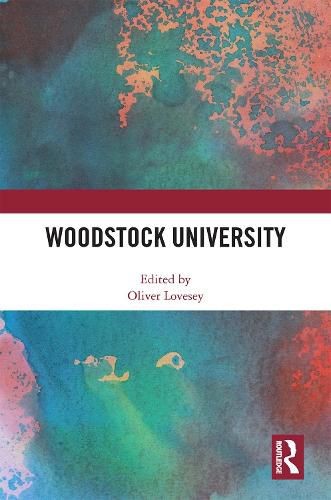Readings Newsletter
Become a Readings Member to make your shopping experience even easier.
Sign in or sign up for free!
You’re not far away from qualifying for FREE standard shipping within Australia
You’ve qualified for FREE standard shipping within Australia
The cart is loading…






Woodstock University addresses the educational interface of 1969’s iconic Woodstock Festival, as a number of its attendees and performers would later become academics ‘with a touch of gray,’ and it also considers the role of music in Woodstock’s legacy as the embodiment of 1960s countercultural idealism, escapism, and activism. A self-mythologizing event, as indicated by congratulatory stage announcements, Woodstock made a real-time claim for its own historic importance. Elevated by its remarkable (and in some cases doctored) audio, celluloid, and oral history afterlives, Woodstock would enhance the aura of rock star celebrity, and in the process expose the counterculture as a cash cow and weaponize the machinery of corporate rock.
The essays in this collection are the participant observations of performers and attendees of Woodstock and related festivals, and also the reflections of cultural historians on aspects of the festival, its representation, and its ambiguous legacy.
The chapters in this book were originally published as a special issue of the journal Popular Music and Society.
$9.00 standard shipping within Australia
FREE standard shipping within Australia for orders over $100.00
Express & International shipping calculated at checkout
Woodstock University addresses the educational interface of 1969’s iconic Woodstock Festival, as a number of its attendees and performers would later become academics ‘with a touch of gray,’ and it also considers the role of music in Woodstock’s legacy as the embodiment of 1960s countercultural idealism, escapism, and activism. A self-mythologizing event, as indicated by congratulatory stage announcements, Woodstock made a real-time claim for its own historic importance. Elevated by its remarkable (and in some cases doctored) audio, celluloid, and oral history afterlives, Woodstock would enhance the aura of rock star celebrity, and in the process expose the counterculture as a cash cow and weaponize the machinery of corporate rock.
The essays in this collection are the participant observations of performers and attendees of Woodstock and related festivals, and also the reflections of cultural historians on aspects of the festival, its representation, and its ambiguous legacy.
The chapters in this book were originally published as a special issue of the journal Popular Music and Society.